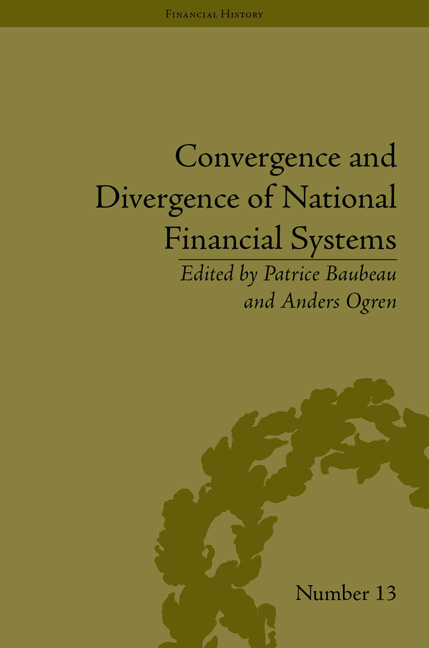 Convergence and Divergence of National Financial Systems
Convergence and Divergence of National Financial Systems Book contents
- Frontmatter
- CONTENTS
- Acknowledgements
- List of Figures
- Introduction
- Part I The Social Mechanisms of Financial Convergence
- Part II National Convergences and Divergences in the Long Term
- Part III Convergence and Historical Shocks
- 7 Determinants of National Financial Systems: The Role of Historical Events
- 8 The Financing of the Spanish Civil War, 1936–9
- 9 The London Financial Crisis of 1914
- Part IV Convergence and Monetary Constraint
- Notes
- Works Cited
- Index
7 - Determinants of National Financial Systems: The Role of Historical Events
from Part III - Convergence and Historical Shocks
- Frontmatter
- CONTENTS
- Acknowledgements
- List of Figures
- Introduction
- Part I The Social Mechanisms of Financial Convergence
- Part II National Convergences and Divergences in the Long Term
- Part III Convergence and Historical Shocks
- 7 Determinants of National Financial Systems: The Role of Historical Events
- 8 The Financing of the Spanish Civil War, 1936–9
- 9 The London Financial Crisis of 1914
- Part IV Convergence and Monetary Constraint
- Notes
- Works Cited
- Index
Summary
‘The only true, the only real Oeconomy is Peace’
John, Earl of Stair, quoted by J. Brewer, 1990Introduction
Studies of today's national financial structures have for a couple of decades been concerned with finding the main factor that lies behind the evolvement of different types of financial system. Indeed, such a factor may help explain why a country would rely rather on a ‘bank-based’ system that is more geared towards information-gathering and processing organizations, or on a ‘market-based’ system that is more geared towards competing individual agents that are meeting on an (more or less) open market.
Theoretical and empirical inquiries on such issues have been developing for over fifty years, fuelled by the apparent bank-to-market shift ignited in OECD countries at the end of the 1970s and the return of financial crises, almost nonexistent in developed countries during the Bretton Woods era.
Nevertheless one can still roughly divide the explanations for why a country would adhere to the one type or the other into two categories: 1) structural explanations or 2) developmental (or evolutionary) explanations.
The first category of explanations relies on the idea of (almost) permanent influence from certain social factors such as the legal basis, the distribution of political power, the existence of entrenched social or economic powers and so on. These are assumed to exert a constant (or at least an extreme long-term) influence on institutional development and thus serve a key role also for present financial structures. The second category is more concerned with the pattern of economic and financial development over time, and relies on the link between specific difficulties or challenges (regional imbalances, information asymmetry, relative backwardness and so on) and the build-up of institutional solutions to these difficulties. Academic historians tend to rely more on the second approach, which allows them to expand historical explanations and use careful contextual analysis.
- Type
- Chapter
- Information
- Convergence and Divergence of National Financial SystemsEvidence from the Gold Standards, 1871–1971, pp. 127 - 144Publisher: Pickering & ChattoFirst published in: 2014


